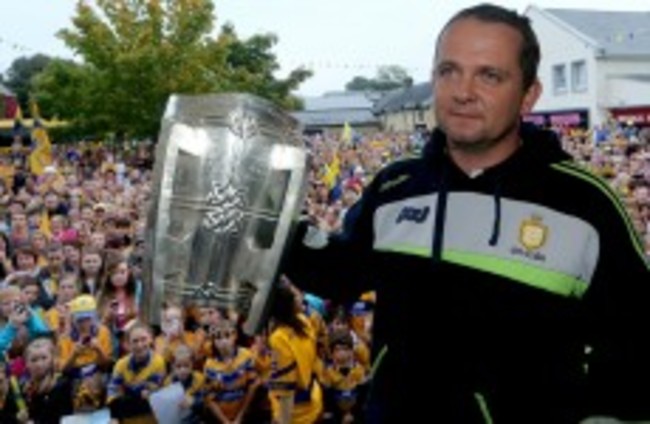CLARE MANAGER DAVY Fitzgerald has spoken candidly about mental health and bullying in a speech to students at Limerick Institute of Technology.
Fitzgerald emphasised the vital role sport plays in people’s lives.
“Sport has an important part to play in your mental well-being and your physical well-being. Sport has dictated my life,” he says.
He spoke of being regularly tormented by bullies during his childhood.
“I got bullied badly when I was in secondary school. It was probably the toughest time in my life. I’ll give you an example — I used to dread getting up in the mornings and going out on the bus, absolutely dread it. I used to sit on the second seat from the front nearly all the time. There were seven or eight guys who used to be laughing at me.
“They’d hit me on the back of the head. They would start pulling my hair when I got out. On two or three mornings, they put egg on my head. They would pull me to the back seat — the bus driver would do nothing — they’d open your shirt and start painting on your body. I got my shoes thrown out the bus window. I felt absolutely so alone and I tried to figure out what this was about. How could someone be so bad-minded to pick on someone like that? Why would you do it? Does it make you smarter? Does it make you feel better?
“[After playing soccer] I went home with a black eye and bruised ribs. I never told my mam or dad anything. To this day, I don’t understand bullying. I cannot understand how people are so insensitive. I cannot understand how you would single someone out and do that. It just doesn’t make sense.”
Howver, the three-time All-Star says he ultimately derived strength from their persistent taunting.
“Those people amounted to little, because their morals and their issues were so bad in their own lives. But did they make me stronger? They did without a shadow of a doubt.
“People often ask me why I’ve an attitude on the sideline. I’ve an attitude because I won’t let anyone walk down on top of me.”
Fitzgerald also spoke of the virtues of sport, recalling how he made his “closest friends” from it. He added that his biggest regret was stopping playing in 2007. He was told he had a 95% blockage on the artery of his heart two years later, and believes that “going from playing seven days a week to doing nothing at all was definitely a factor”.
He emphasised the importance of having ambitions.
“At an early age I had a dream. I believe you should have dreams and you should have goals, no matter what your story is. It doesn’t matter whether it’s sport or if it’s a profession that you want, I believe you should have a dream. My dream from about four or five years of age was to play in goal for Clare.
“I didn’t care about anything else. That was my focus. That was my goal. One of the biggest things I’ve ever had in my life; having that goal in front of me and having that belief that I wanted to do something.
“Things in the mid-1970s were tough. All I had was my hurley and my ball. I used to go to a wall with my ball and lay cardboard on the wall and I used to pretend I was this hurler called Séamus Durack, and I did that every day religiously… I think it’s important that you have something to focus on in life.
He added that bullying should never be tolerated.
“No one is perfect… I’ve often looked at smartarses that think they know it all. To me, I go through them for a short cut, if I see someone make fun of someone, I won’t let them, because you’re not as smart as you let on, you’re not as tough as you let on. The better people will stand up and say, I’m going to be my own person.
“I’ll be honest about it, when I was feeling low. I just kept thinking, I have a dream. I used to get my hurley and go out and play hurling. I used to do something I love straight away. I would encourage anyone that comes across being made feel that low, go to that place where you know that you have something you love doing.”
The 42-year-old also spoke of the lows of sport, citing his experience with Waterford in the All-Ireland final as a prime example.
“There are 85,000 people there. I’m on the sideline. We’re getting beaten 28-30 points by Kilkenny, absolutely hammering us. I accepted responsibility from the media [for the loss]. I’ll never forget coming up to the dressing room afterwards, the boys were gone. I actually fell to my knees. My dad and my best friend Liam were there. I just fell down. I balled out crying. I was in a bad way after it. I couldn’t believe that one minute I was up on a high and the next minute I was down low.”
He said that one of the keys to success was to be “persistent,” citing his own personal triumph in winning the long puck competition after nine years of trying and his team’s eventual All-Ireland win, despite many insisting that Kilkenny were “unbeatable”.
He finished by suggesting his media image was not an entirely accurate reflection of his personality.
“I know people see me on TV and think I’m mad. But I’d like to think there’s a lot of thinking behind me. I’m just an ordinary person, the same as everybody else, who has feelings.”











Arsneal are a spent force and wegner is not helping, I don’t belive for one second that if he had the money he would not spend it something is not right about the boardroom and stan kronke is the problem In my opinion
I agree with most of your comments except I wouldn’t write off Arsenal just yet. Though they have flattered to deceive in recent years they still have some quality players and a proven manager. I also question who really holds the purse strings at the Emirates. Benitez was mad to take the job at Chelsea, it will and does look foolish to take on a job where to get it to the chairmans liking will take patience and time. He wants a Barcelona style set up yet most of their players are from their academy, something that took years to achieve, he needs a settled manager and give them time. I was always a fan of Gibson when at United but he did in missing in games, but as he matures he could get better and better.
Thanks for the response Cathal. On the one hand I don’t want to be kneejerk in suggesting Wenger should go, but it’s hard to see how this cycle can be broken after do many years of gallant failure.
They’ll probably win the league now after all that!
*so many years
Arsenal have to make a good executive decision and get rid of Wenger. Living in the shadow of the Emirates and knowing many Arsenal fans, the feeling among supporters is that he can’t seem to take them any further as a manager. They were atrocious on Saturday.